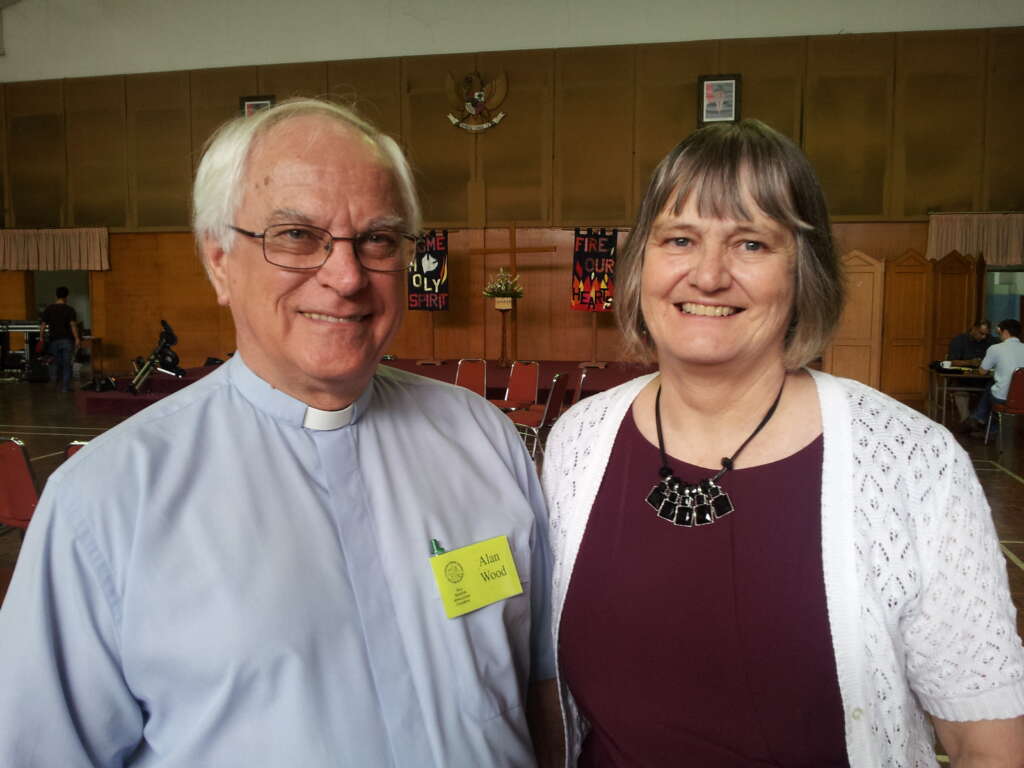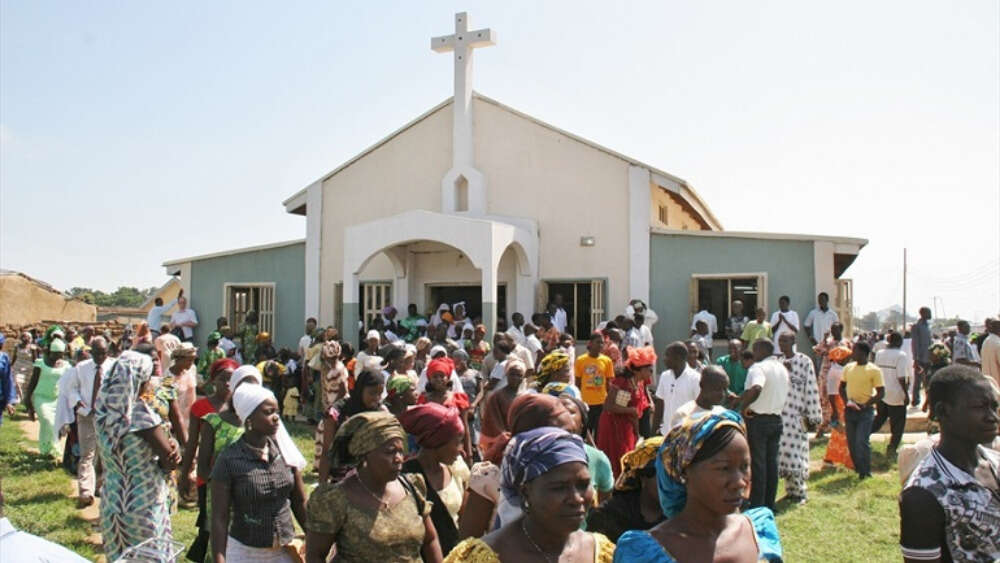Christians murdered, churches bombed – Missionary life in north Nigeria
“The Lord taught us more and more to trust in him”
Alan and Helen Wood’s 40 years of missionary service has not ended the way they hoped. In March 2020, just before Australia shut its borders due to COVID, the Woods had just 30 hours to pack up all their belongings, leave their home in Jakarta, Indonesia, and get on a plane to return to Australia. They didn’t even have time to say goodbye to the members of All Saints Church Jakarta, where Alan had been the minister for the past six years. This meant he had finish his last few months in this role remotely, delivering sermons via YouTube from Australia.
“I think we’re still suffering a lot of grief and trauma over the whole thing,” Alan admits to Eternity over a scratchy phone line from Katoomba, in the Blue Mountains, north of Sydney.
The Woods have just delivered a session to the Church Missionary Society (CMS) Australia Summer School (January 2-7, 2021). Like so many other things that haven’t gone to plan in the past year, the event had to be moved online at the last minute because of Sydney’s COVID outbreak, so Alan and Helen and the other missionaries and speakers are recording their sessions virtually.
Again, it’s a disappointing end for the Woods as it’s their last “official” Summer School before they retire from missionary service with CMS in February.
“The big lesson the Lord has taught us more and more is to trust in him. Even if the circumstances around us are quite violent and dangerous, that he is in control.” – Alan Wood
Yet, if there’s one thing God has taught this couple during their many years of full-time service to God, it’s to trust him despite the circumstances.
“The big lesson the Lord has taught us more and more is to trust in him. Even if the circumstances around us are quite violent and dangerous, that he is in control,” says Alan, when delving into conversation about their missionary life.
“… Right from the beginning, we had a strong sense of God’s call on our lives, and that’s carried us through very, very difficult times.”
The call to Nigeria
When Alan and Helen set out for Nigeria in 1981 – with two young daughters in tow, aged four and six – they had never been on a plane before. They also didn’t have theological training. But they did have a strong sense that God was calling them to overseas service. So when Alan saw a job with Sudan United Mission for a Christian conference centre manager (a job for which he did have experience) in the city of Jos in the middle of Nigeria, he applied, and was successful.
The family spent almost three years in Jos, until the conference centre was forced to close. An even bigger leap of faith awaited them, when they were offered teaching jobs in a bible college in the “bush”, in remote northern Nigeria. Not only had the pair never taught at a bible college before, but Alan admits “we didn’t have a great handle on the language” (Hausa).
“We’d been on a language course right at the beginning [of their time in Nigeria], but when we got to the village, we found that no one spoke English. And we had to teach in [Hausa], so very, very quickly, we had to get proficient in it. I used to take a couple to prepare a lesson …
“But we both soldiered on, and within four months, I was preaching [in Hausa].”

Alan and Helen Wood
On top of learning the language, their new lifestyle also brought other challenges.
“We had no electricity, so we had a kerosene fridge and kerosene lights,” Alan recalls. “We did have a small wind generator, which powered a cassette player, so we could listen to praise songs on cassette and also tune into the BBC radio at 6pm every night.
“There was no communication with the outside world, because this is long before internet and mobile phones, etc. And, in fact, we didn’t even have a two-way radio, which some remote stations had.
“When we first arrived in the village, [the community] dug a well for us, just outside the door of our compound, which was really good of them. And we managed to get a gift from the government of a hand pump for that.”
The Woods lived and worked in the village for five years, with Alan becoming principal of the college and Helen head of the women’s school, where she developed her own curriculum to teach women who were illiterate.
After returning to Australia for furlough, the family went back to Nigeria, but to a theological college in a different location, where Alan was appointed director of studies and Helen lectured in the women’s school. The family spent four years here – taking them to the end of their daughters’ high school years and to the end of Alan’s own theological degree (which he had been doing by correspondence). And so, having decided it was time to return to Australia in 1993 so their daughters could attend university, Alan was ordained in the Anglican Church in Jos just before they left Nigeria.
A surprising return
In 2006 – 13 years after their return to Australia, during which time they worked in church ministry in Bomaderry (NSW) and Picton (south Sydney) – Alan and Helen had already begun to feel a pull back to Nigeria. Then they were invited to dinner with a visiting Nigerian archdeacon, who had in fact been ordained in Jos in the same cohort as Alan.
“He asked us a question that night: ‘So when are you coming back to Nigeria?’ We thought, OK, perhaps God is saying something. Then, a little while later, someone else asked us the same question, quite out of the blue. So we started to look at possibilities of where we would go back.”
In 2007, the couple returned to northern Nigeria (this time with CMS, and without their now-adult children) to serve in a theological college in Wusasa, Zaria. Sadly, they found a very different landscape.
“So much had changed … We saw a general dilapidation of the whole north of Nigeria. Infrastructure was just ignored. Roads were full of potholes and there were broken-down electrical connections and water connections,” says Alan.
“I don’t think there’s any place in the north of Nigeria now where there’s water pipes that work. The electricity even now goes off all the time – it will go off for three days, and then suddenly it’ll come on for an hour and then it’ll go off again. So life is pretty miserable for people in the north.”
In the nearby area, 12 churches in three cities were destroyed in terrorist attacks.
But the most shocking change was the increasing persecution of Christians in this part of the country.
By 2009, extremist Islamic militant group Boko Haram had risen to power.
“That started the systematic bombings of churches and murders. A terrible time it was,” Alan recalls.
In the nearby area, 12 churches in three cities were destroyed in terrorist attacks, he says.
“There was a period of about two years when many Christians stopped going to church. It was almost like you would wake up on Sunday and ask the question of yourself, will our church be next? That caused a lot of people to stay away, and some to even return to or flee to the south.”
Alan describes everyday life during those years as “pretty hard”. “In the kilometre between us and the major junction down the road, there were about four roadblocks. For quite a while we had curfews, so it was very difficult to move around. And the terrorism kept on going.”
Helen came into the firing line one day when the church-owned hospital where she was temporarily working as an administrator came under attack. She bravely ignored the advice of the hospital security guard to hide under the desk, and instead ran out into the midst of the skirmish to usher fleeing people inside the hospital.
“… the answer to terrorism is not guns and bombs, but it’s through prayer.” – Alan Wood
And yet, through faith and prayer, the Woods and other local Christians continued to see God at work.
“I was able to help local people to see that the answer to terrorism is not guns and bombs, but it’s through prayer,” Alan explains. “And many of the bishops in the north actually took up the same idea and were trying to get their people to trust in God and not in human weapons.
“While the churches emptied out for while, we started to see people coming back to the churches and congregations growing again. And the college that we were teaching in, year by year enrolments continued to grow.
“These young men were offering themselves to train as pastors to go out into villages in the north, and possibly lose their lives because of their faith. It was a work of God, I believe.”
Despite the dangers, the Woods had determined to stay in Nigeria until retirement. However, they were forced to return to Australia in 2013 as Ken required back surgery, and afterwards, he would no longer be able to sustain the northern Nigerian lifestyle, which required lugging heavy cans of water and petrol.
While the pair initially took this as the signal to retire, God didn’t. In 2014, they followed God’s call to Jakarta to fill in at All Saints for just a few months – a stint that turned into six years.
A lifetime’s legacy
When asked about their greatest achievements during 40 years of full-time ministry – 19 in Nigeria, 6 in Jakarta and 15 in Australia – Alan begins to tell stories. These are stories of young Nigerian men they taught at college, who went on to gain PhDs or become church leaders – one in particular who spent 28 years planting churches across south-east Nigeria, Uganda and Rwanda and is now reaching retirement himself.
Then there’s the young women who Helen has ministered to and guided, one living with HIV AIDS. And the refugees (mostly from Afghanistan) who came to know Christ and were nurtured in their faith through the Woods and others at their church in Jakarta.
And there’s the continued growth of the theological colleges, churches and other Christians in northern Nigeria who the Woods still keep in touch with; a growth that comes despite persecution from Boko Haram and now the Fulani herdsmen.
“I think our personal witness has been probably one of the most outstanding things,” Alan says, in trying to sum up their achievements. “Just to live amongst people who probably have not experienced much of genuine Christianity. It’s hard to say that without blowing your own trumpet. But just living a godly lifestyle, I think has had great impact.”
He is quick to add, “But through all our service, we couldn’t have done it without our supporters. People have been faithfully praying for us and supporting us since 1981, especially from our sending churches in Kiama and Bomaderry. So this is not just our legacy, but it’s the legacy of all Australian Christians who are in partnership with us.”
Email This Story
Why not send this to a friend?




